The Rainmaker of the Luba Tribe
Reading Time: 7 min
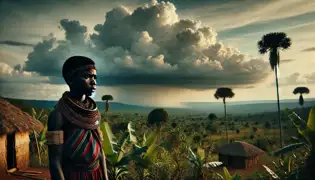
About Story: The Rainmaker of the Luba Tribe is a Myth from dominica set in the Ancient. This Poetic tale explores themes of Nature and is suitable for All Ages. It offers Cultural insights. A young apprentice must overcome doubt and fear to become the Rainmaker and save his people from a devastating drought.
In the vast and untamed lands of the Congo, where the emerald jungle meets the golden savanna, the Luba people thrived for centuries. Their villages were built with wisdom passed down through generations, their traditions rooted in the spirits of the land, the rivers, and the sky. Among these traditions, none was as sacred as the calling of the Rainmaker.
The Rainmaker was not just a mere man or woman but a bridge between the living and the ancestors, a vessel through which the spirits spoke. Without the Rainmaker, the rains would not come, and without the rains, life itself would vanish.
This is the tale of Kalala, a young man who carried the weight of his people’s survival on his shoulders. He was chosen to be the next Rainmaker, but doubt clouded his heart. Could he truly summon the heavens? Could he wield the power of the spirits? Or would he fail and doom his people to drought and famine?
This is the story of his trials, his fears, and his awakening. The village of Katanga had always known seasons of abundance, when the rivers swelled with life and the fields yielded maize, cassava, and plantains in plenty. But this year, the heavens had shut their doors. The drought had arrived like a silent curse. For months, the sky remained an unbroken expanse of blue, devoid of clouds. The rivers shrank, their beds cracked like broken pottery. The cattle, once fat and strong, stood gaunt with ribs protruding from their hides. The children no longer laughed as they played but sat in the shade, listless and weak. At dusk, the elders called for a great meeting. The entire village gathered in the Great Circle beneath the ancient baobab tree, its twisted branches stretching toward the heavens like pleading arms. Chief Mwene Kanyoka rose, his voice grave. “Our land withers. The crops refuse to grow, and the cattle grow sickly. We have waited for the rains, but they do not come.” A murmur ran through the villagers. “The Rainmaker must act,” an elder rasped, his voice hoarse with age. “Where is Mzee Luhuma?” All eyes turned toward the old man seated near the fire. Mzee Luhuma, the Rainmaker of the Luba, was no longer the strong figure he once was. His hands trembled, his once-powerful voice now barely more than a whisper. “My time is over,” he said. “The spirits have chosen another.” The villagers stiffened. The answer was known, yet spoken aloud, it carried weight. Kalala. Kalala was the chosen one, the apprentice who had trained under Mzee Luhuma’s guidance. But he was young. Unproven. Chief Mwene Kanyoka fixed Kalala with his sharp gaze. “You must summon the rains, Kalala. Without them, we will not survive another moon cycle.” A lump formed in Kalala’s throat. He had studied the rituals, chanted the incantations, and watched Mzee Luhuma call upon the heavens. But never had he done it himself. What if he failed? “The spirits have chosen you,” Mzee Luhuma murmured. “The question is not whether you are ready, but whether you will listen.” The fire crackled. The weight of a hundred eyes pressed down on Kalala. “I will try,” he whispered. That night, Kalala sat before the dying embers of the fire outside Mzee Luhuma’s hut. The old Rainmaker placed a small bundle of herbs into Kalala’s hands. “You must go to the Mountain of Echoes,” Luhuma said. “There, the spirits will test you. If you pass, they will grant you the power to call the rains.” The Mountain of Echoes lay deep in the jungle, a place where few dared to go. It was said that only the worthy could reach its peak and return. At dawn, Kalala set out, armed with nothing but his staff and the sacred pouch of herbs. The jungle swallowed him whole. Thick vines snaked across the path, forcing him to cut his way through. The air was damp and heavy, filled with the distant cries of unseen creatures. At times, he heard whispers—soft voices calling his name from the shadows. By the second day, hunger gnawed at his belly. He gathered wild berries, careful to avoid those that were bitter—Mzee Luhuma had taught him the difference. On the third night, he awoke to a pair of glowing eyes watching him from the undergrowth. A panther. He remained still, his heart pounding. The great cat stared at him, unblinking. Then, without a sound, it turned and melted back into the darkness. A test, perhaps. By the fourth day, he reached the Mountain of Echoes. Its cliffs loomed before him, their faces marked with strange carvings—the language of the ancestors. At the summit, he built a fire and sprinkled the sacred herbs into the flames. Thick smoke rose, twisting and shifting until it took the form of spectral figures. The spirits had come. "You seek the rain," a deep voice boomed. "Yes," Kalala answered. "But I do not know how." A figure stepped forward, cloaked in mist. "The rain does not come from the sky alone, Kalala. It comes from within. To summon it, you must become the storm itself." The wind howled. Kalala felt a strange energy coursing through him, as if his very veins had turned to lightning. "The time has come," the spirits whispered. "Return to your people." Kalala descended the mountain, his mind racing. The spirits had spoken, but had they truly given him the power? Or had they merely given him the belief? When he reached the village, the people rushed to him. "Did the spirits speak?" Chief Mwene Kanyoka asked. Kalala nodded. "I must call the storm." The villagers gathered in the Great Circle. The drummers began to play, their rhythms echoing through the night. Kalala raised his arms, his voice rising in a chant older than the village itself. The wind stirred. A breeze at first, then a gust that sent dust swirling into the air. Kalala felt something deep within him, something vast and untamed. He lifted his staff—and the sky, once empty, darkened with swirling clouds. A bolt of lightning slashed across the heavens. The villagers gasped. The wind roared, bending the trees. And then, the first drops of rain fell. A whisper at first, then a torrent. The villagers erupted in cheers. Children danced, elders wept, and cattle lifted their heads to drink from the fresh puddles. Kalala fell to his knees, exhausted. He had done it. He had become the Rainmaker. For three days, the rains continued, filling the rivers and reviving the land. Kalala was no longer an apprentice—he was the protector of his people. Mzee Luhuma smiled. "You have embraced your calling, Kalala." But Kalala knew the journey was not over. To be a Rainmaker was not just to summon storms—it was to understand the balance of all things. He vowed to honor that gift. As the village celebrated, Kalala stood at the edge of the Great Circle, watching the storm clouds linger. The spirits had chosen him. And now, he walked with them. Kalala’s name became legend. His tale was passed from elder to child, told around the fires for generations. And even today, when the droughts come and the first rain falls, the Luba people smile and say— "The Rainmaker walks among us once more."A Land of Cracked Earth
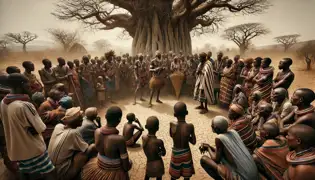
The Path of the Spirits
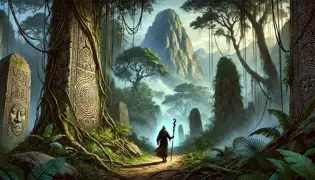
The Trial of the Storm
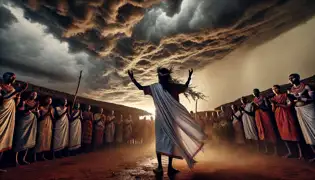
The Keeper of Balance
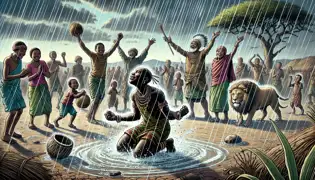
Epilogue: The Legacy of the Rainmaker

















